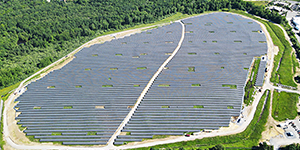SUPPORTING CLEAN ENERGY OPTIONS
FirstEnergy is taking many steps to prepare for a reduced carbon world, and each state where we operate presents a different path toward the clean energy future. Though regulatory decisions may limit our ability to develop renewable generation, we recognize that our customers expect more sustainable energy options and are exploring ways to meet that demand across our service territory.
Four of the five states in which FirstEnergy principally operates (Ohio, Pennsylvania, New Jersey and Maryland) are deregulated states that prohibit utilities from owning generation. With a few exceptions, FirstEnergy's utilites are prohibited from owning generation in these states. This includes renewable sources such as solar and wind as well as energy storage when storage is defined as a generation asset.
We want to empower our customers with solutions that meet their energy needs and reduce the region’s carbon footprint. Working within the bounds of state laws and regulations, we are continually looking for and acting on opportunities to build the clean energy future we all envision.
Solar Generation
Advancing FirstEnergy’s goal to own at least 50 megawatts (MW) of solar generation in West Virginia by 2025 is a key step toward executing our climate strategy and building a sustainable energy future. In January 2024, Mon Power completed work and put the Fort Martin solar site into service. This site is the first of five planned solar sites Mon Power and its sister company Potomac Edison have planned to help bolster and diversify the region’s energy mix.
Nearly 50,000 solar panels are now generating renewable energy at the approximately 80-acre Fort Martin site, which can produce up to 18.9 MW of solar energy per hour. One MW of solar energy powers a national average of 173 homes, according to the Solar Energy Industries Association.
Ultimately, the companies’ five sites are expected to collectively generate up to 50 megawatts of renewable energy. In August 2023, the West Virginia Public Service Commission (PSC) approved the companies’ request to construct the Fort Martin solar site and two others in Rivesville, Marion County (5.5 MW), and Marlowe, Berkeley County (5.7 MW). Construction of the sites is expected to be complete by the end of 2024.
The companies plan to seek final approval from the PSC later this year to build the additional two solar sites in Davis, Tucker County (11.5 MW), and Weirton, Hancock County (8.4 MW) once customers subscribe to the energy they will produce. The companies expect to complete construction of the final two sites by the end of 2025.
Additionally, FirstEnergy Pennsylvania received approval to purchase electric generation supply in 2023. The program includes a process for procuring power for Default Service customers, meeting state-mandated alternative energy standards, and includes a separate bidding process to procure a new long-term solar energy project with a total capacity of at least 7 MW and up to 20 MW.
SUPPORTING THE GLOBAL ENERGY TRANSITION

In New Jersey, JCP&L completed a grid connection for a 19.8-megawatt solar project located at a former landfill property in Mount Olive. The largest landfill solar project in North America is now delivering clean energy through FirstEnergy's transmission lines.
Offshore Wind
In October 2022, through a competitive solicitation process, the New Jersey Board of Public Utilities (NJBPU), in coordination with regional grid operator PJM Interconnection (PJM), awarded Jersey Central Power and Light (JCP&L) several onshore transmission upgrade projects utilizing existing rights-of-way (ROW) to support New Jersey’s goal of introducing 11,000 MW of offshore wind-generated electricity by 2035. JCP&L continues to build infrastructure for these projects, collectively referred to as the New Jersey Clean Energy Corridor (NJCEC), despite Orsted suspending its two US wind projects.
The projects were carefully designed to maximize existing grid infrastructure and minimize disruption to the way New Jersey residents live and enjoy their communities. JCP&L will use approximately 40 miles of existing power line corridors for the upgrades, and the projects will not require any new construction on undeveloped land outside of JCP&L’s owned property or existing ROW.
Through its NJCEC projects, JCP&L is helping modernize New Jersey’s energy grid by upgrading existing high-voltage transmission infrastructure and enabling the state to handle the growing demand for electricity now and for years to come. The work will enhance JCP&L’s ability to deliver power efficiently and reliably and connect new sources of clean, renewable energy to the grid. The nearly $905 million investment is expected to begin in 2025, with completion targeted by 2030.
Battery Energy Storage
In Maryland, Potomac Edison is implementing two battery energy storage projects in response to the state's Energy Storage Pilot Program, which was established in 2019 to examine new technologies that could have a transformative impact on electric distribution systems. The program allowed all investor-owned electric utilities to submit at least two energy storage proposals to the Maryland Public Service Commission for consideration.
- In December 2022, we became the first utility to complete a project under Maryland’s program, pairing battery energy storage with two new electric vehicle (EV) fast-charging stations and one Level 2 charging station in Frederick County. Because fast-charging stations create significant demand on electric grids, the bundling of the energy storage system with fast chargers will allow Potomac Edison to study how energy storage can help minimize the impact of such demand spikes on its network.
- The second project, a 1.75-megawatt battery energy storage project planned for Allegany County, will provide back-up power to more than 1,000 customers during outages, enhancing service reliability in an area west of the town of Hancock. That project is expected to be in service in 2024.
